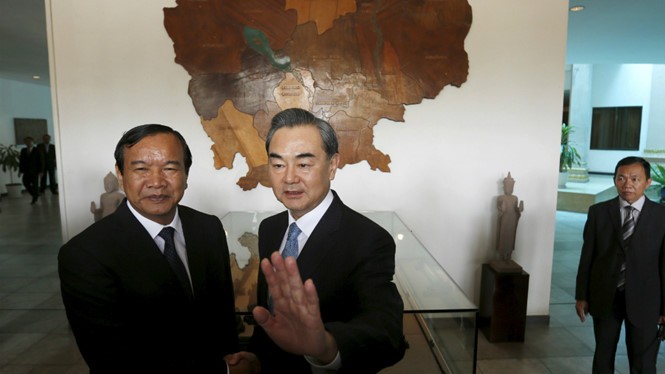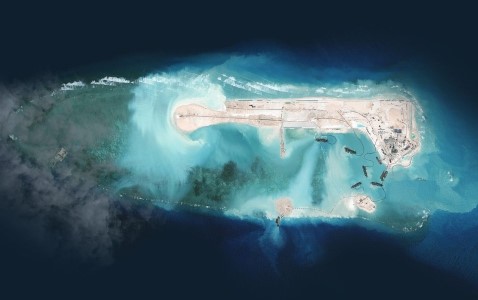(VOVworld)- Chinese Foreign Minister Wang Yi concluded his tour of 3 Southeast Asian nations on Sunday with a statement on a 4-point agreement on the East Sea. The visit came with The Permanent Court of Arbitration (PCA) in The Hague, Netherlands, about to announce its final ruling on the Philippines’ maritime rights lawsuit against China. Some analysts say Beijing’s scheme behind this visit was to cause division within ASEAN over East Sea disputes.
 |
| Chinese and Cambodian Foreign Ministers at a meeting in Phnom Penh (Photo: Reuters) |
Arguing that East Sea disputes are not “an issue between China and ASEAN” and should not affect their ties, the 4-point agreement that Beijing announced is aimed at winning diplomatic support before The Permanent Court of Arbitration (PCA) makes its final decision on the Philippines’ complaints against China’s nine-dotted line claim.
Beijing seeks ASEAN allies
After ending his tour of Laos, Cambodia and Brunei, Chinese Foreign Minister Wang Yi said in a press briefing that China and the 3 ASEAN nations have agreed that disputes over islands, rocks and sand banks are not “an issue between China and ASEAN”. He added that each of the 4 countries has the right to resolve disputes in accordance with international laws that others should respect.
The PCA is likely to deliver a ruling in favour of the Philippines by the end of May or early June. Earlier, China rejected the PCA s’ authority, insisting on resolving disputes bilaterally and seeking opponents to the court’s ruling. It’s not coincidental that Beijing sent its top diplomat to Laos, Cambodia and Brunei ahead of the ASEAN Foreign Ministers’ Meeting (AMM) slated for this summer which will be attended by the new foreign ministers of these 3 countries. Furthermore, the host country will be Laos, which is not directly involved in territorial disputes in the East Sea. Experts say that by eliciting the support from some ASEAN members, China is attempting to prevent ASEAN from having a united voice.
 |
Satellite image shows China's illegal construction on Fiery Cross Reef (Photo: AP)
|
Concerned about a united ASEAN
An ASEAN diplomat said “China is worried that ASEAN will issue a joint statement following the final ruling of the Permanent Court of Arbitration. That’s why Beijing publicly courted some ASEAN members, while conducting behind-the scene diplomacy to persuade them not to act in the interests of the other members.
Laos, Cambodia and Brunei have not made any official comment on the 4-point agreement. On April 25 in Indonesia, ASEAN Secretary General Le Luong Minh repeated the ASEAN 6-point stance of respecting international laws, the 1982 UN Conventions on the Law of the Sea and the principle of resolving disputes peacefully and refraining from acts that change the status quo in the East Sea. ASEAN calls for fully and effectively implementing the Declaration on the Conduct of Parties in the East Sea signed by China and ASEN in 2002 and speeding up negotiations for the Code of Conduct in the East Sea.
Thailand’s official media outlets recently posted an article warning of China’s acts in the East Sea and urging ASEAN to be united to wisely deal with such acts.
A peaceful, stable and developing ASEAN is impossible without stability in the East Sea. Creating consensus and promoting unity among members should be included in the agenda of ASEAN meetings, including the 49th ASEAN Foreign Ministers’ Meeting to be held in July in Laos. This will be a test of ASEAN unity following the recent formation of an ASEAN community.